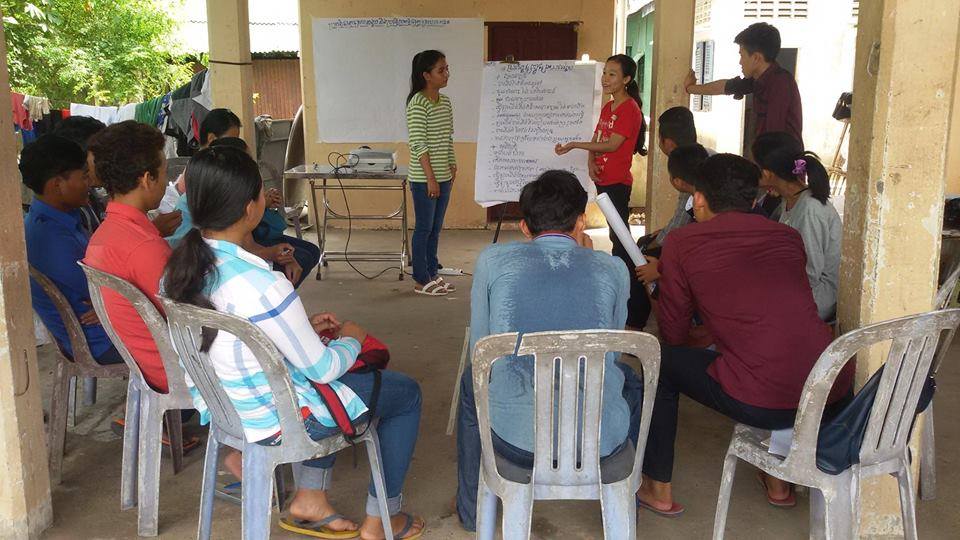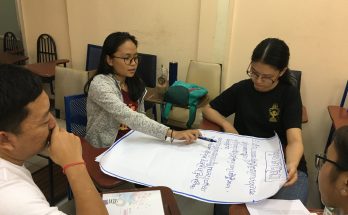It might be boring if someone approaches and tells you that the new school term starts in October because that is normal in Cambodia. However, you would be surprised if you were told that a total of 94,500 grade 12 for the students are learning Media Literacy as part of their official curriculum for this 2016-17 academic year.
With the Ministry of Education, Youth and Sports (MoEYS) of Cambodia finally approving the inclusion of Media Literacy in its official high school curriculum, social media such as Facebook, Twitter, Line, Instagram, and Google+ are not only used for fun, but also for learning and sharing knowledge in an official, professional, and secure way.
With the cooperation of Germany-based Deutsche Welle (DW) Akademie, the Cambodian Center for Independent Media (CCIM), has worked on a two and half-year project to train 100 Cambodian youths on Media Literacy in Svay Rieng province, and sees the move of the MoEYS as a positive development towards the rights of freedom of expression and access to information. Since this is the first time Media Literacy has been introduced into classrooms, CCIM believes that there must be challenges, given the lack of technical skills, and that there is a need to continue working on improving Media Literacy.
Just like in other countries in the region, many young Cambodians use social media for fun. Nonetheless, it is not the case for Miss Kong Chanphynou, an 18-year old student studying at Svay Rieng High School. “I have used a smart phone to access Facebook for years, but I never knew exactly what Media Literacy was until I joined CCIM in late 2014,” admitted Chanphynou, who is both a trainee and facilitator of the training in her local community. Information, Chanphynou claims, is important for society, but accessing high quality information is even more important. “We need analytical skills to identify which source of news is more reliable,” said Chanphynou.
Being surrounded by several customers coming to buy goods at her store, Miss Va Sodachan is very busy with her job, but she does not hesitate to acknowledge that CCIM-run training is actually useful for her, her family and friends. Similarly to Chanphynou, Sodachan, who is now a freshman doing a degree in accounting at Svay Rieng University, had no idea what Media Literacy was. According to Sodachan, the training provided her skills in writing, interviewing people and taking photos using a smart phone. “I am able to verify sources of information posted on Facebook to make sure it is true and I know how to access my Facebook account in a secure way,” said Sodachan.

Training high school students on Media Literacy requires solid commitment and flexibility. Mr. Mam Vibol, a project coordinator at CCIM, said that high school students are smart and they learn things quickly. But the problem, according to Vibol, is that they are too busy with their studies and it is very difficult for them to allocate time to join the training. It is also difficult to agree to meet at any specific time. “Each training lasts for four consecutive days and experience tells me that it is very hard to invite them to join,” said Vibol, adding, “there are many important things listed in the lessons and it is impossible to shorten the training to less than four days.”
Equally important, not all of students have smart phones. Vibol said this issue is very challenging because students need to practice in the real world what they learn in the classroom. While smart phones have become more popular, many young students are using them with limited knowledge in terms of code of ethics and technical skills.
In short, Media Literacy training is a long-term challenge. The introduction of Media Literacy into the official high school curriculum is a remarkable development, and definitely contributes to the promotion of freedom of expression and access to online information. This achievement, however, does not mean that our mission is complete. Indeed, we have only just begun. There are more challenges to deal with and CCIM is committed to working on them. (Sek Sophal)
Related article:
Media Literacy enters Cambodian classrooms
http://www.dw.com/en/media-literacy-enters-cambodian-classrooms/a-35986176



